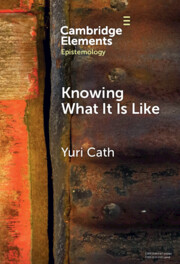Element contents
Knowing What It Is Like
Published online by Cambridge University Press: 02 December 2024
Summary
Keywords
- Type
- Element
- Information
- Series: Elements in EpistemologyOnline ISBN: 9781009323758Publisher: Cambridge University PressPrint publication: 19 December 2024

